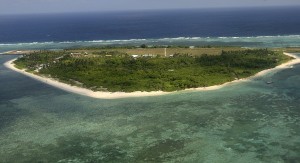MANILA, Philippines–The position taken by the nominee to become the top US diplomat in East Asia on the territorial disputes in the South China Sea is music to Malacañang’s ears, bolstering the Aquino administration’s decision to bring the Philippines’ conflict with China to the United Nations for arbitration.
US diplomat Danny Russel told a Senate panel at his confirmation hearing Thursday that there was no place for “coercion and bullying” in East Asia, referring to China’s growing assertiveness in its territorial disputes with Japan, Taiwan and four Southeast Asian countries, including the Philippines, in the South China Sea (West Philippine Sea).
“That’s a welcome statement … [I]t’s in line with our efforts, with what we’ve been doing. Our position has always been that there’s no need for coercion when it comes to resolving our maritime disputes,” deputy presidential spokesperson Abigail Valte said in a radio interview on Saturday.
Russel told the Senate panel that he would do everything in his power to “lower the temperature” in territorial disputes in the South and East China Seas and push claimants, including China, toward diplomacy.
He also said it was “unacceptable” for China to demand only bilateral negotiations with the other claimants, and voiced strong US support for efforts by Southeast Asia to negotiate a “code of conduct” to manage the disputes—an issue to be taken up at regional security talks in Brunei later this month.
Russel is the current White House senior director for Asian affairs. If confirmed by the full Senate, he will become assistant secretary for East Asian and Pacific Affairs, replacing Kurt Campbell who resigned in February.
Valte said Russel’s statement was “consistent with the statement of others supportive of our position—that this conflict should be resolved peacefully, within the proper venue and with the right process.”
She said the Department of Foreign Affairs (DFA) expected the arbitration case to move soon with the creation of a five-man team to handle the case in the United Nations International Tribunal for the Law of the Sea (Itlos).
“I think the DFA expects that there will be movement. The next step, apart from the formation of the panel, [is] the panel deciding if it has jurisdiction over the action, and I think that is supposed to come sometime in July,” Valte said.
The panel of five international arbitrators that would hear the Philippine case against China’s claims in the West Philippine Sea was filled in April, after Judge Shunji Yanai, president of Itlos, appointed the last three members.
“That means the case is moving and, as expected, we are hoping that this case that we filed in the tribunal will proceed as soon as possible,” said DFA spokesperson Raul Hernandez when he announced the panel’s completion in a press briefing last month.
The arbitrators come from Sri Lanka, France, the Netherlands, Poland and Germany.
The Philippines filed the case on Jan. 22 in hopes of halting China’s incursion into established Philippine maritime borders in the West Philippine Sea.
The Philippine case also seeks to invalidate China’s claim to nearly the whole sea, including parts within the exclusive economic zones of its Southeast Asian neighbors.
China has rejected the proceedings, citing “indisputable sovereignty” over virtually all of the resource-rich waters.
The process will, however, continue even without the participation of China, as stipulated in the United Nations Convention on the Law of the Sea.
First posted 9:23 pm | Saturday, June 22nd, 2013


